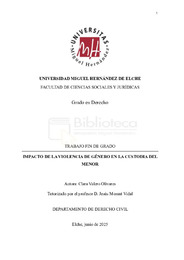Resumen :
Este trabajo de fin de grado analiza el impacto que la violencia de género ejerce sobre los menores en el ámbito de la guarda y custodia, explorando cómo el ordenamiento jurídico español afronta esta problemática desde una perspectiva legal, jurisprudencial y doctrinal. Se parte del reconocimiento del menor no como mero espectador, sino como víctima directa o indirecta de la violencia sufrida por su madre, y se estudian las consecuencias que ello tiene sobre sus derechos y desarrollo personal. El análisis se estructura en torno a cinco grandes bloques: el concepto de violencia de género y su repercusión en los menores, el régimen de guarda y custodia en situaciones de violencia, la configuración legal del interés superior del menor, el régimen de visitas cuando existe violencia, y el tratamiento procesal de estos casos, incluyendo la necesidad de formación especializada de los operadores jurídicos. A través de un estudio normativo, jurisprudencial y doctrinal, se concluye que la violencia de género constituye un factor excluyente para la atribución de la custodia compartida y que el interés superior del menor exige soluciones jurídicas específicas y protectoras. El trabajo incorpora referencias actualizadas a la Ley Orgánica 1/2004, la Ley Orgánica 8/2021, el Código Civil y sentencias del Tribunal Supremo hasta 2025.
This undergraduate thesis analyzes the impact that gender-based violence has on minors within the framework of custody and guardianship, exploring how the Spanish legal system addresses this issue from legal, jurisprudential, and doctrinal perspectives. The study begins by recognizing that children are not merely passive observers, but direct or indirect victims of the violence suffered by their mothers, and it examines the consequences this has on their rights and personal development. The analysis is structured around five main areas: the concept of gender-based violence and its effects on minors; the legal framework for custody in situations of violence; the legal configuration of the best interests of the child; the visitation regime when violence is present; and the procedural treatment of these cases, including the need for specialized training for legal professionals. Through a normative, jurisprudential, and doctrinal study, the thesis concludes that gender-based violence constitutes an excluding factor for the awarding of joint custody, and that the best interests of the child demand specific and protective legal solutions. The work incorporates up-to-date references to Organic Law 1/2004, Organic Law 8/2021, the Spanish Civil Code, and Supreme Court rulings up to 2025.
|
 La licencia se describe como: Atribución-NonComercial-NoDerivada 4.0 Internacional.
La licencia se describe como: Atribución-NonComercial-NoDerivada 4.0 Internacional.
.png)
